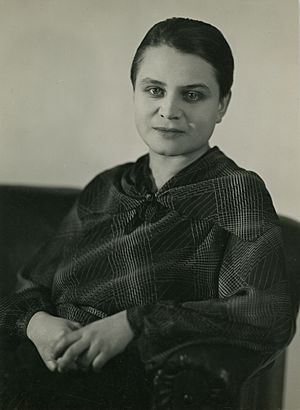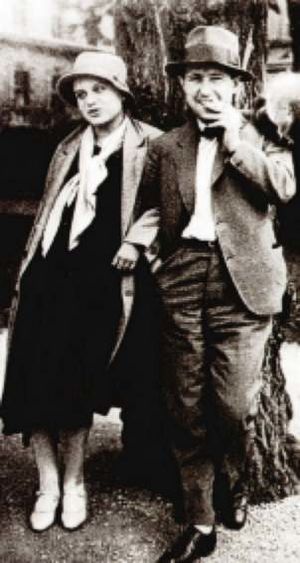Toyen facts for kids
Quick facts for kids
Toyen
|
|
|---|---|

Toyen in 1930
|
|
| Born |
Marie Čermínová
21 September 1902 |
| Died | 9 November 1980 (aged 78) Paris, France
|
| Resting place | Batignolles Cemetery, Paris, France |
| Nationality | Austro-Hungarian |
| Education | Academy of Arts, Architecture and Design in Prague |
| Occupation |
|
| Partner(s) | Jindřich Štyrský |
| Signature | |

Toyen (born Marie Čermínová; 21 September 1902 – 9 November 1980) was a famous Czech painter, drafter, and illustrator. She was an important member of the Surrealist art movement.
In 1923, Marie chose the name Toyen as her artist name. Some people think the name comes from the French word 'citoyen,' which means 'citizen.' Others believe it's a play on the Czech phrase ‘to je on,’ meaning ‘it is he.’ Toyen liked this name because it didn't sound like a boy's or a girl's name.
Contents
About Toyen's Life
Early Years and Art School
Toyen left her family home when she was 16 years old. She wanted to focus on her art.
From 1919 to 1920, Toyen studied decorative arts at the UMPRUM in Prague. She worked closely with another Surrealist artist and poet, Jindřich Štyrský, for many years. They were great friends and artistic partners.
Finding a Unique Style: Artificialism
In 1923, Toyen joined a Czech art group called Devětsil. This group had strong connections with artists from other countries, especially France. Other famous members included the poet Jaroslav Seifert and the architect Karel Teige.
In the early 1920s, Toyen traveled to Paris, France. Soon after, she moved there with Jindřich Štyrský. While living in Paris, they created their own art style called Artificialism. They described Artificialism as when a painter creates poetry without using words. It was a new way of thinking about art, different from other styles like Abstraction and Surrealism. Toyen and Štyrský returned to Prague in 1928.
Toyen also illustrated over 500 books. For example, she illustrated The Purple Land in 1930.
Joining the Surrealists
In March 1934, Toyen and Štyrský helped start the Czech Surrealist Group. They joined other artists, writers, and the composer Jaroslav Ježek. Surrealism was an art movement that explored dreams and the imagination.
Art During Difficult Times
During the Second World War, when the Nazis occupied Czechoslovakia, Toyen had to hide. She helped shelter her friend and fellow artist, Jindřich Heisler, who was a Jewish poet.
In 1947, Toyen and Heisler moved to Paris permanently. They joined the Parisian Surrealists and continued to work with famous artists like André Breton. Toyen kept working with poets and writers who were part of the Surrealist movement.
Remembering Toyen
An asteroid, (4691) Toyen, was named in her honor. This shows how important her contributions to art were.
See also
 In Spanish: Toyen para niños
In Spanish: Toyen para niños
 | William M. Jackson |
 | Juan E. Gilbert |
 | Neil deGrasse Tyson |

